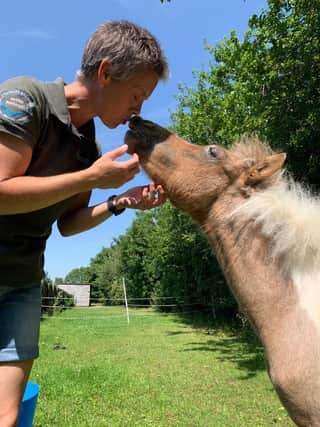RSPCA reveals 700 animals are waiting for space at animal centre and appeals for foster carers to help free up space


The charity estimates it is spending an eye-watering £26,000 a week to private boarders for the temporary care of hundreds of rescued animals - including dogs, cats, rabbits, small furry animals, exotic pets, birds and farm animals - as its 59 rehoming centres are “full to bursting”.And so, the RSPCA has launched an urgent new drive to recruit more fosterers - who care for animals temporarily in their own home, while supported by the RSPCA - to help ease the pressure.
The shocking new statistics come as the RSPCA’s annual rehoming campaign - Adoptober - continues to shine a light on the work of the charity's animal centres, and the rescue pets looking for a second chance of happiness.Brian Reeves, head of volunteering at the RSPCA, said: “We are struggling - including in Nottinghamshire and Lincolnshire. “RSPCA centres across England and Wales are full to bursting at the moment which means we’re having to use vital charity funds to pay for animals to be cared for with private boarders, and have a long waiting list of animals waiting to come into our centres where they can start their search for a new home.
Advertisement
Hide AdAdvertisement
Hide Ad“We are in the middle of an animal crisis and we can only see it getting worse over the winter months as the cost of living crisis bites. It’s absolutely vital that we free up as much space in RSPCA centres now, so we’ve got room for animal victims of neglect and cruelty we rescued in the coming weeks and months - and more fosterers is going to be crucial in achieving that.”The animal welfare charity has 14 national rehoming centres across England and Wales – including six in the Nottinghamshire and Lincolnshire region – with a further 45 centres run by RSPCA branches, which are separate charities in their own right.
Brian says the charity currently has 350 foster carers registered, with even more supporting the 145-strong network of RSPCA branches - but the charity urgently needs more.
He added: “As more animals come into our care, stay for longer with us, and less people are adopting, we’re in a really worrying situation.
“It’s a real space race at the moment - with no room at so many of our jam-packed centres.“Fortunately, we have 350 incredible fosterers already - and we are so grateful to them all; but we urgently need more. These fosterers welcome rescue animals in their own homes on a temporary basis, fully supported by the RSPCA, and are invaluable to us.“Times are tough, but fostering could be a lifeline to helping us rescue more animals over the next few months. It is not only an amazing, rewarding volunteering opportunity; but could also help alleviate real pressure on our resources and help tackle this growing animal welfare crisis.”The RSPCA provides foster carers with all the financial, emotional and some logistical support they need in providing temporary care for the animal - including any medication the pet may be taking and funding for any ongoing veterinary treatment.Fostering also gives people who would normally be unable to take in an animal long-term, due to other commitments, an alternative and an opportunity to have pets in the home.
Advertisement
Hide AdAdvertisement
Hide AdEquine physiotherapist Sarah Harris, from Lincolnshire, wanted a horsey friend for her 15-year-old Irish cob, Tommy, and decided to contact the RSPCA for help in finding the right match.
She took on five-year-old Thoroughbred cross Graham in 2019 and was thrilled when he ‘fitted in so beautifully, so she and her partner decided to contact the charity again for another equine to join their herd.
Seven-year-old Spencer soon joined the family, and then the RSPCA team got in touch with her again to ask if she could help with a nine-month-old miniature foal, Rebel, who was part of an ongoing cruelty investigation.
“Rebel was unlevel and needed rehab so the RSPCA felt I’d be able to help him,” Sarah explained. “One day this 8hh bundle of fluff turned up on a 3.5 tonne lorry although I think he could have come in the boot of a car! He was so small!
Advertisement
Hide AdAdvertisement
Hide Ad“The driver warned me Rebel was nervous and scatty. But he came down the ramp, tilted his nose up to me and gave me a kiss. Since then, he’s well and truly put his slippers under the table! He loves to wind up my other three, sneak into the fields he’s not supposed to be in, and chases the chickens.
“He’s best friends with Graham and they’re like little and large galloping around the field together! He likes to hide under Tommy’s belly and when my physio students come over he’s always the favourite.
“I’m not sure I’m the best fosterer because it looks like Rebel will be staying for good! He’s been such a delight, has really grown into himself, and knows exactly how to be naughty and cute so that he can get away with murder. We just can’t imagine life without him now!”
Those interested in applying to be an RSPCA fosterer can do so online via the RSPCA's volunteering portal at volunteer.rspca.org.uk.